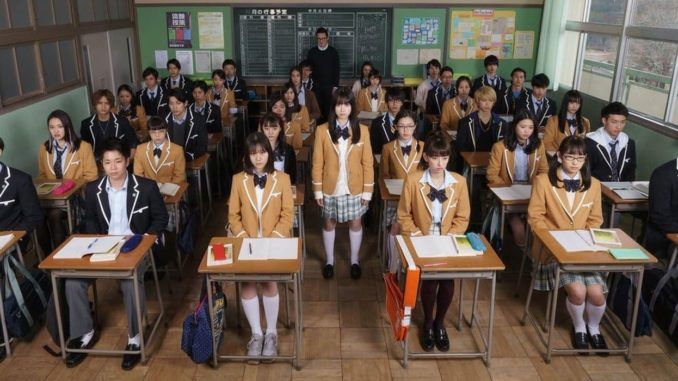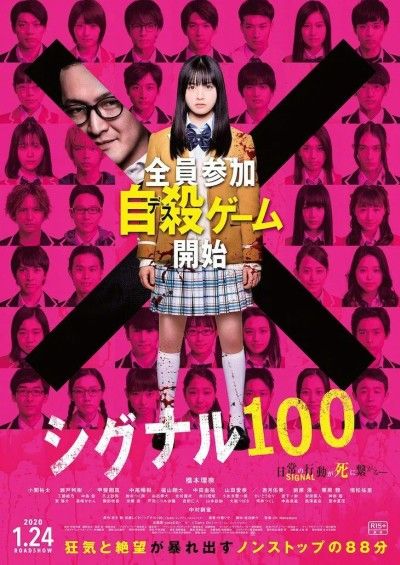
Rating: C+
Dir: Lisa Takeba
Star: Kanna Hashimoto, Yûta Koseki, Toshiki Seto, Shouma Kai
There’s a fabulous, if thoroughly implausible, concept here and the film initially does a good job of selling it. Inevitably, it’s not able to sustain itself, collapsing in like a burst balloon, and limping over the finish line. A great first half-hour though, which I’d say just about justifies the overall experience for me. It starts off feeling like a twisted version of Battle Royale. The thirty-six pupils in a high-school class are shown a bizarre video by their teacher, and immediately afterward, begin to commit suicide. Turns out, the video was originally created by a cult for mind-control purposes, causing members who broke any of the group’s numerous rules to kill themselves.
The teacher has now repurposed it, adding some more triggers of his own, such as using a cellphone and leaving the school grounds. He’s also told all their parents they’re staying overnight to prepare for a festival. He informs the students that the only way out, is to be the last person standing, which will break the hypnotic suggestion. Further inquiry is derailed by the teacher throwing himself off a balcony. Immediately, some class members begin working to be the final one. In particular, Wada (Seto) acquires knowledge about some of the cult’s rules, and begins trying to trick classmates into breaking them. Not everyone is as single-minded or self-centred, with Rena (Hashimoto) and Sota (Koseki) preferring a more cooperative approach, and believing they can best get through things together.
 As mentioned, this hits the ground running, initially portraying school as an almost idyllic location, where friendship and love will blossom. This rug is then rudely yanked out from under our feet, as the carnage kicks off. It does so in a way which leaves the viewer feeling disoriented by the brutal self-harm, similarly to Sion Sono’s Suicide Circle. However, the further we go in, the more the movie has to tie itself in knots. For example, initially the triggers make sense: attempting harm to another person is a logical no-no. But by the end, we are in a place where “being pointed at by seven people” makes you kill yourself. Wait, what?
As mentioned, this hits the ground running, initially portraying school as an almost idyllic location, where friendship and love will blossom. This rug is then rudely yanked out from under our feet, as the carnage kicks off. It does so in a way which leaves the viewer feeling disoriented by the brutal self-harm, similarly to Sion Sono’s Suicide Circle. However, the further we go in, the more the movie has to tie itself in knots. For example, initially the triggers make sense: attempting harm to another person is a logical no-no. But by the end, we are in a place where “being pointed at by seven people” makes you kill yourself. Wait, what?
Conveniently, shortly thereafter we’re down to fourteen survivors, in two groups of seven. Really, what are the odds? Maybe the manga on which it’s (again, almost inevitably) based did a better job of painting the narrative. Or perhaps part of the point is to demonstrate the ridiculous, counter-productive nature of the strict rules by which Japanese society operates? It’s all unclear, and the same goes regarding any motive for the teacher – especially to go through what feels like a lot of trouble, only for him not to stick around and enjoy the results. There seems to be a trend with these kinds of Japanese shows and movies; they come up with some brilliant ideas, yet are unable to stick the landing. By the end here, not much except the occasionally imaginative self-demises were genuinely holding my attention.
